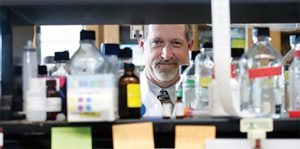Kerafast Providers Supporting the Fight Against COVID-19
At this critical time when the world is living through a global pandemic, research labs around the world are jumping to action to fight against the coronavirus. SARS-CoV-2 research is being conducted and clinical trials have started at an unparalleled rate. At Kerafast, we have quickly adapted to support the providers and research reagents that contribute to this meaningful work. We have seen many of our providers featured in the news for their COVID-19 contributions. Some of the notable work is featured below.
Dr. Michel Whitt, University of Tennessee

Dr. Whitt in the lab. Credit: University of Tennessee
Dr. Whitt’s vesicular stomatitis virus reagents have been highly popular for coronavirus research. The Delta-G-VSV pseudotyping system is widely used as a model system for studying viruses and vaccines, proving useful for COVID-19 research applications. Using the pseudotyping system, scientists can insert the SARS-CoV-2 spike protein into the modified VSV, enabling research at a lower biosafety level than required for live coronavirus. Additionally, the system enables rapid screening for neutralizing antibodies, which can be useful for evaluating potential vaccines as well as determining whether people possess protective antibodies following exposure to COVID-19 infection.
The University of Tennessee recently highlighted Dr. Whitt’s meaningful work in their blog. Dr. Whitt noted, “We have a real opportunity to make a difference during this pandemic. If we can help people get over the curve and provide reliable information that helps determine if it’s okay to go back to work or not, I think that would be great.”
Kerafast has worked to provide Dr. Whitt with the materials he needs to quickly deliver these reagents to customers. We previously conducted a case study with Dr. Whitt’s lab showing how we’ve enabled his busy lab to fulfill reagent request with less time and effort through our online MTA and simplified shipping. This streamlined process has been especially effective with the increased demand due to COVID-19.
Dr. Brian Geiss, Colorado State University

Brian J. Geiss, PhD
Dr. Geiss added a SARS-CoV-2 Nucleocapsid Protein Expression Plasmid to our reagent catalog in May. This plasmid expresses a protein that can be used in assays to indicate presence of SARS-CoV-2 nucleocapsid protein antibodies in patient samples. Dr. Geiss has been active in communicating the risk COVID-19 poses especially to older people. He wrote an article for Colorado State University in March discussing the general risk of spreading COVID-19 to the elderly and how to prevent the spread of the virus. We have also seen him active within his university community by participating in a forum on the science of coronavirus with other CSU experts. In addition to the new SARS-CoV-2 Nucleocapsid Protein Expression Plasmid, Dr. Geiss also offers a variety of Sindbis Virus and Zika Virus plasmids in our catalog.
Dr. Amitabha Bandyopadhyay, Indian Institute of Technology Kanpur

Amitabha Bandyopadhyay, PhD
Dr. Bandyopadhyay has made remarkable efforts to produce ventilators in India for hospitalized COVID-19 patients. Ventilators made in India cost only a fraction in comparison to foreign-made ones, therefore becoming a necessity for hospitals with increasing patient demands. Dr. Bandyopadhyay reached out to local firms with a call-to-action to produce ventilators along with the help of doctors and a top biomedical engineer. According to Business Line, ventilator production was scheduled to start on June 1st with the goal of making 1,000 ventilators.
As a Kerafast provider, Dr. Bandyopadhyay offers a BMP Responsive Reporter Osteoblast Cell Line which is available for bone research.
Dr. James Crowe, Vanderbilt University

Dr. James Crowe, Director Vanderbilt Vaccine Center. Credit: John Russell
Dr. Crowe is an immunologist at Vanderbilt University who was in the midst of a research study looking at monoclonal antibodies against potential epidemic-causing viruses when SARS-CoV-2 started to spread. His team was able to procure blood samples from patients who recovered from COVID-19 and screened the white blood cells to pick out the plasma B cells that carry SARS-CoV-2 specific antibodies. By extracting the antibody-encoding DNA from those cells, Dr. Crowe’s team was able to synthesize antibodies that neutralized the virus in vitro.
According to Dr. Crowe, “[We] literally handed them off to manufacturers within the first few months of an outbreak. That’s what’s different now, is that these technologies have matured to the point where we can compress the time down to weeks- this type of thing used to take years.” Dr. Crowe is now partnering with some of the top companies who are preparing for clinical trials in July or August.
Dr. Crowe’s B Cell Activating Feeder Cell Line, available in our reagents catalog, can be used as a feeder layer to generate B cell cultures yielding human monoclonal antibodies.
Coronavirus Research Reagents
Kerafast offers a variety of coronavirus research reagents that may be helpful if you are also a researcher working in this field. In addition to those mentioned above, some other available reagents include:
- Recombinant Coronavirus Antibodies from our sister company Absolute Antibody
- SARS-CoV Spike Protein [S391] Antibody from National Jewish Health
- SARS Non-Structural Protein 8 [5A10] Antibody from A*STAR Institute of Molecular and Cell Biology Monoclonal Antibody Unit
- MERS Nucleocapsid [9H10.2.3] Antibody from A*STAR Institute of Molecular and Cell Biology Monoclonal Antibody Unit


